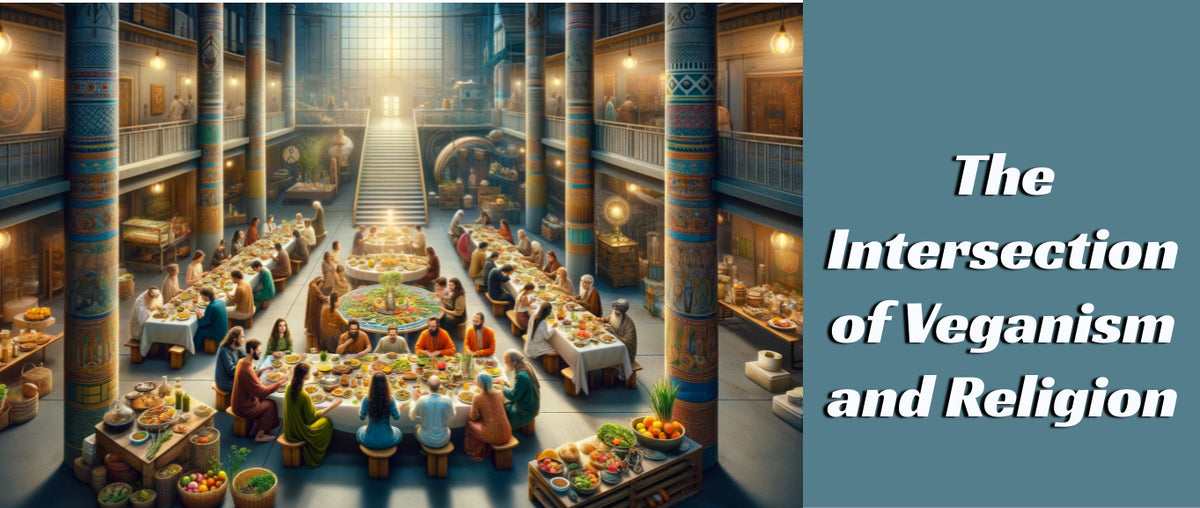The Intersection of Veganism and Religiona
Key Takeaways
- Early Christianity provided a foundation for compassionate eating, with an emphasis on simplicity and purity in dietary choices, aligning with modern vegan practices.
- Hinduism and Buddhism emphasize the principle of Ahimsa (non-violence), advocating for plant-based diets as an expression of compassion toward all living beings.
- Islam promotes mercy and compassion, with a growing number of Muslims interpreting these values as supportive of veganism and ethical dietary practices.
- The anticipated launch of the Medium Partner Program in India represents a potential boon for writers focusing on veganism, health, and ethical living, highlighting the global interest in plant-based lifestyles.
Early Christianity and the Roots of Compassionate Eating
The intersection of veganism and religion finds intriguing roots in Early Christianity, where the diet was not just about sustenance but also a manifestation of faith, compassion, and a simpler way of life. The early Christians, in their pursuit of purity and ethical living, often adopted dietary practices that closely align with modern Vegan products and plant based foods. The emphasis on cholesterol free foods and fat-free butter like alternatives can be seen as an extension of the ascetic lifestyle that prioritized abstinence from animal products, not just for health but as a moral choice.
The teachings of compassion towards all beings, a central tenet in early Christian texts, resonate with the vegan ethos. The notion of mercy and kindness extends beyond human interactions, including our treatment of animals. This aligns with the contemporary vegan movement's emphasis on Vegan Cheese, plant-based cheese, and unsalted butter alternatives, illustrating a continuity of values from early Christian practices to modern dietary choices.
Furthermore, the concept of Unprocessed Cheese and Cashew Butter reflects a return to unadulterated, simple foods, mirroring the early Christian emphasis on natural, unprocessed diets. This historical perspective not only enriches the narrative of veganism in religious contexts but also underscores the ethical and health-conscious choices inherent in vegan food products today.

Hinduism and Buddhism: Ahimsa and the Ethical Diet
Hinduism and Buddhism share a profound respect for all living beings, encapsulated in the principle of Ahimsa, or non-violence. This principle is a cornerstone of both religions and serves as a guiding light for followers to adopt plant-based foods and vegan products as expressions of their faith. The reverence for life inherent in Ahimsa directly influences the dietary choices of millions, encouraging the consumption of vegan butter, vegan mayo, and other vegan items that do no harm to animals.
In Hinduism, the cow is considered sacred, a belief that underscores the religion's preference for plant-based cheese and vegan cheese over traditional dairy products. Similarly, Buddhism's emphasis on compassion and mindfulness fosters a diet that excludes animal products, highlighting the ethical dimensions of consuming plant-based products and cholesterol-free foods.
The integration of garlic butter and unsalted butter alternatives in traditional Hindu and Buddhist meals showcases the religions' adaptability and commitment to principles that align closely with veganism. This adaptability not only reflects the religions' historical roots but also their ongoing evolution in embracing vegan food products as part of a compassionate lifestyle.
Islam and Muslims: Compassion in Dietary Laws
In the Islamic tradition, compassion and mercy are paramount virtues that extend to all creatures. This ethos is reflected in the dietary laws of Islam, which, while permitting the consumption of meat, emphasize humane treatment and animal welfare. A growing number of Muslims interpret these principles in a way that aligns with veganism, choosing vegan food products and plant-based foods to embody the true spirit of compassion in their daily lives.
The concept of vegan mayo, vegan butter, and other vegan items is gaining traction within Muslim communities as alternatives that honor Islamic teachings on kindness. Fat-free butter and garlic butter alternatives are becoming more popular in culinary traditions, offering health benefits in addition to ethical considerations. By adopting plant-based cheese and vegan cheese, Muslims are finding ways to reconcile their dietary habits with the values of mercy and compassion that Islam holds dear.
Medium Partner Program: A Glimpse into Its Future in India
The Medium Partner Program, known for enabling writers worldwide to monetize their content, has seen varying levels of accessibility across different countries. Its launch in India is highly anticipated, given the country's burgeoning digital content market. Factors such as regulatory requirements, payment processing logistics, and local content moderation standards play a significant role in determining the program's availability in different regions.
For Indian writers interested in topics like vegan products, cholesterol-free foods, and plant-based products, the program's introduction could open new avenues for sharing and monetizing content on veganism and health. As the platform evaluates these factors, the potential for a vibrant community of Indian writers offering insights into vegan cheese, cashew butter, and unsalted butter alternatives grows, promising a rich exchange of ideas and information in the near future.








